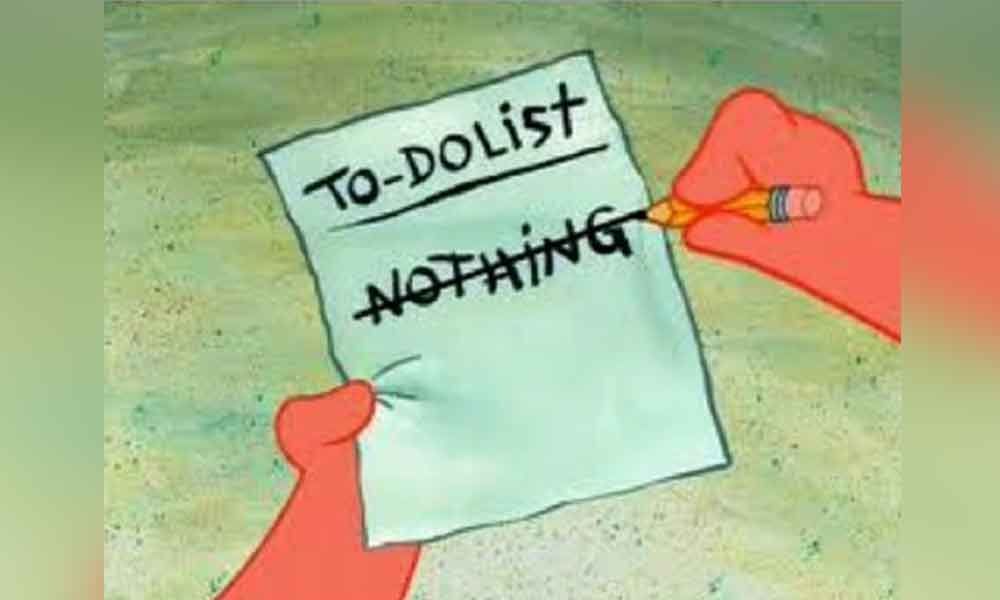The Importance of Doing Nothing

By giving the cerebrum 'vacation' we can improve emotional well-being and enable plans to hatch.
By giving the cerebrum 'vacation' we can improve emotional well-being and enable plans to hatch.
"Learning without reflection is a waste, reflection without learning is dangerous" - Confucius
In the present arranged society we are in danger of getting to be casualties of data over-burden. Contemplation and reflection have turned out to be under-appreciated skills as the impulse to 'simply complete this' or 'discover that' is frequently too extraordinary to even think about resisting. Be that as it may, working more enthusiastically isn't really working more intelligent. Indeed relaxing and putting aside normal times of 'sitting idle' might be the best thing we can do to incite perspectives that support our creative mind and improve our psychological well-being.
Hecticness versus profitable occupation
Our lives have turned out to be characterized by hecticness. Check out you at the train station, in bistros, out in the city, individuals are stuck to their versatile handset or tablet.
I as of late asked an official I once trained what number of messages she got multi-day. "500," she let me know. "Be that as it may, I don't peruse any of them. On the off chance that I did, I wouldn't carry out my responsibility."
The test, she said wasn't accomplishing data yet "pushing it away so I don't experience the ill effects of data over-burden. I need time to think."
Helen, as I'll call her, has an associate who experiences every one of her messages and she puts in a couple of hours consistently talking about risky ones with him. "I'm not paid to do that sort of work," she clarified "in case I'm so caught up with doing what individuals anticipate that I should do there will be no time left for what I should do. You can't do inventive work at a digital pace."
Helen has a point and I have gained for a fact that numerous individuals would be in an ideal situation on the off chance that they did less and reflected more.
In any case, doing nothing has never truly been adequate. We partner it with flightiness, squandering our life. A large portion of us feels remorseful on the off chance that we don't have something to do. Then again we get a buzz when we feel truly occupied. Diversion prompting practices like always browsing email animate the mind to shoot dopamine into the circulatory system giving us a surge that can make halting so a lot harder.
The peril is we may lose our associations, with each other as well as with ourselves. In the event that we don't permit ourselves times of continuous, unreservedly related ideas then self-improvement, knowledge, and innovativeness are less inclined to develop.
The advantages of fatigue
Sitting idle and fatigue are intently entwined, as noted in my ongoing paper
Doing Nothing and Nothing To Do: The Hidden estimation of Empty Time and Boredom. While a large portion of us think that it's difficult to endure in numerous occasions weariness can be a prelude to something. It can trigger our creative mind and innovativeness. As it were, weariness can be viewed as a liminal space, a basic asset that pushes us to look for the new.
Be that as it may, in the digital age, where we have a practically boundless choice of amusement and diversion to hand, it's simpler to end up in a condition of steady hecticness than it is to sit idle. Our frantic exercises on the internet – a universe of performing multiple tasks and hyperactivity – help us to misdirect ourselves that we are beneficial. Actually, online networking is extremely receptive however not exceptionally unique. It contracts imagination and can affect psychological well-being. On the off chance that we don't have a clue how to adjust the harmony among activity and reflection, we may turn into a loss of mental burnout.
Work environment
Tragically in contemporary associations work addicts are profoundly empowered, bolstered and even compensated. The treacherous improvement of the hyper safeguard is hard to counter in light of the fact that such conduct is helpful to associations. Also, there is a component of control. There's the demeanor, "I'm paying that individual a decent compensation, for what reason aren't they at their work area working?"
Be that as it may, there isn't really a connection between buckling down and working brilliantly. Truth be told an obsessive worker condition may add to genuine individual and psychological well-being issues including low spirit, discouragement, substance misuse, working environment badgering, relationship breakdown or more normal non-appearance.
The best administrators are the individuals who can both act and reflect, which means unplugging themselves from the impulse to keep occupied.
Three different ways to set aside a few minutes for sitting idle
1. Look after connections
We need significant contact with individuals to feel completely invigorated. Keeping up our connections needs cooperation, commitment, and break.
2. Saying No
Having the option to state no is one of the most valuable abilities we can create. Saying no isn't really egotistical and saying yes to each demand isn't solid. Disapproving of insignificant solicitations can save time for increasingly significant things.
3. Overseeing rest propensities
Ideally, we should all rest eight hours per night. Rest is fundamental for self-awareness and imagination. Poor resting propensities are verification we haven't ventured off the treadmill of hecticness.
Brooding thoughts through the intuitive idea
Sitting idle or having nothing to do, are profitable open doors for invigorating oblivious points of view. Oblivious idea exceeds expectations at incorporating and partner data, by subliminally doing cooperative pursuits over our wide database of learning. In this locale of the mind, we are less obliged by customary affiliations and bound to create original thoughts than when we deliberately center around critical thinking.
The result of these procedures may not generally enter our awareness right away. They may need time to hatch. The recommendation here is that just as being the best thing for our emotional well-being, sitting idle – or relaxing – may end up being the most ideal approach to determine complex issues.
A decent issue solver keeps on working unknowingly on an issue subsequent to relinquishing the cognizant work. Imaginative arrangements can be found by working discontinuously on the issue while taking care of unremarkable exercises, for example, going for a stroll, driving, perusing or playing with kids.
The advantages of blocking out and concentrating on the present are picking up in notoriety in the corporate world with numerous administrators currently going to care contemplation to help their basic leadership and critical thinking. This can be a bandage arrangement in the event that an official works manically for nine hours, at that point goes to a care session toward the end. Preferably time ought to be taken during the day. A stroll around outside or time went through with your feet on the work area, can be more gainful than working through a mid-day break.
Italian painter Giorgio Vasari summed it up well when he said: "Men of virtuoso some of the time achieve most when they work least".
There are some notable instances of splendid thoughts that came to individuals "out of the blue", from Archimedes in his shower to Newton in his Lincolnshire nursery and Paul McCartney who woke one morning having formed the tune for "Yesterday" in his rest.
Brooding time can be presented from numerous points of view. Organizations, for example, 3M, Pixar, Google, Twitter, and Facebook have made 'disengaged time' key parts of their work environment.
Perceiving the need to work more brilliant
Regularly the give-away that we are buckling down (and not brilliant enough) is the point at which we end up in a spot where there's in every case more to do. We trick ourselves into imagining that on the off chance that we do only one more thing we will almost certainly unwind. This reasoning is preposterous; either our plan for the day will keep on stretching or we believe we could improve. In the event that we stall out in this attitude, it's a great opportunity to get off the treadmill and enjoy a reprieve. What's more, shockingly, frequently after a time of separation the issue will look very changed and we may discover the appropriate response was in that spot from the start, gazing us in the face.














